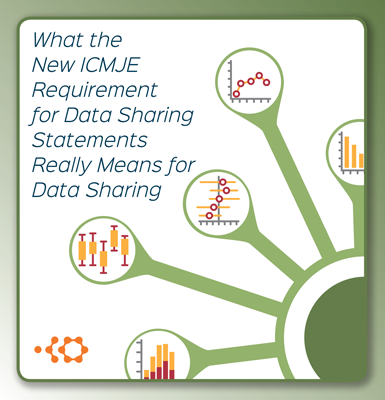What the New ICMJE Requirement for Data Sharing Statements Really Means for Data Sharing
As of July 1, 2018, manuscripts submitted to International Committee of Medical Journal Editors (ICMJE)-member journals must be accompanied by a data sharing statement. What is the new requirement, how did it evolve, and what does it mean for data sharing?
In January 2016, the ICMJE proposed that authors of all clinical trial manuscripts published in member journals share de-identified individual-patient data (IPD) underlying their results within 6 months of publication.1 The proposal included data in tables, figures, appendices, and supplemental materials. The ICMJE invited comments on its proposal and a firestorm ensued. Although many individuals and groups applauded the ICMJE proposal, others raised legitimate concerns. Some were concerned about inappropriate analyses of data without statistical rigor, and authors were concerned about competition and losing control and/or credit for their work. Others voiced concerns about the practical aspects of how to share the huge amounts of data generated by some studies, particularly large, phase 3, randomized trials. Still others raised persistent concerns about patients’ right to privacy, particularly in the rare disease setting, where, despite de-identification efforts, patients still might be identifiable.
In June 2017, 18 months after the original proposal, the ICMJE published an editorial with a new requirement,2 which does not mandate data sharing but does require a data sharing statement be included in all manuscripts. As of July 1, 2018, authors will be required to include the following information as a part of a data sharing statement when submitting to an ICMJE-member journal:
- If IPD will be available and, if so, what data will be shared
- Any other documents that will be available (ie, study protocol, statistical analysis plan, clinical study report)
- When the data will be available
- Who will be able to access the data and for what purposes
- How to request the data
In addition to requiring data sharing statements in manuscripts, the ICMJE also amended its clinical trial registration policy to include a data sharing plan within the trial’s registration (effective for trials that begin enrolling patients as of January 1, 2019).
To be clear, the ICMJE is not requiring authors to share data, and a statement as simple as “Data will not be shared” fulfills the new requirement. However, the ICMJE does note that editors may take data sharing statements into consideration when making editorial decisions on acceptance of manuscripts for publication.
In its original proposal,1 the ICMJE also suggested new requirements for manuscripts that describe the results of any analysis performed with publicly shared data. New requirements for secondary analyses will also go into effect July 1, 2018,2 with no major changes from the original suggestion. Unfortunately, this new requirement for the citation of data sources has been overshadowed by the controversy of data sharing. This guidance requires authors to clearly credit authors of the original clinical study publication, cite the original analysis, and attest that their use of the data is in accordance with any terms that were made when the data were shared by the authors of the original publication. This requirement is a critical improvement and will clarify what analyses were pre-planned vs post hoc, retrospective, or secondary, and will enhance understanding of the data’s origin.
Some stakeholders may feel that data from clinical trials must be shared and that the new ICMJE requirement does not go far enough to push the medical and scientific community toward that goal. Although the new ICMJE requirement for data sharing statements does not mandate data sharing, it does oblige the medical and scientific community to engage in a dialogue on the topic, which may bring us closer to resolving many complex and thorny issues. During this dialogue, all stakeholders have a lot to think about. Sponsors must evaluate the effect data sharing could have on plans for drug approval and marketing and consider how to ensure that the rights of patients participating in their clinical trials will be protected. Authors need to weigh the pros and cons of having access to others’ data for interesting analyses and giving up some control of their own data to afford others the same intellectual opportunity. Perhaps most importantly, patients and their contributions to clinical trials cannot be forgotten during these conversations. Will sharing of clinical trial data advance science and improve patient care? Will the identity of individual patients be adequately safeguarded?
It will be interesting to see how the medical publishing community and pharmaceutical industry handle this requirement. Are they ready to embrace data sharing or is there still hesitation? With July 1, 2018, rapidly approaching, it’s only a matter of time until we find out!
 Amanda Vreeland, PhD, combines her scientific expertise and research experience in molecular pharmacology with 1 year of global medical communications agency experience providing content development and strategic and tactical planning support for medical communications and publications across a variety of therapeutic areas including oncology, hematology, and infectious disease. Connect with Amanda on LinkedIn.
Amanda Vreeland, PhD, combines her scientific expertise and research experience in molecular pharmacology with 1 year of global medical communications agency experience providing content development and strategic and tactical planning support for medical communications and publications across a variety of therapeutic areas including oncology, hematology, and infectious disease. Connect with Amanda on LinkedIn.
Reference
- Taichman DB, Backus J, Baethge C, et al. Sharing clinical trial data: a proposal from the International Committee of Medical Journal Editors [editorial]. Ann Intern Med. 2016;164(7):505-506. [PMID: 26792258] doi:10.7326/M15-2928
- Taichman DB, Sahni P, Pinborg A, et al. Data sharing statements for clinical trials: a requirement of the International Committee of Medical Journal Editors [editorial]. Ann Intern Med. 2017;167(1):63-65. [PMID: 28586790] doi: 7326/M17-1028

